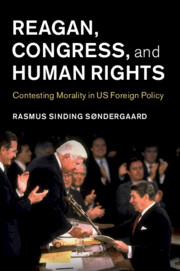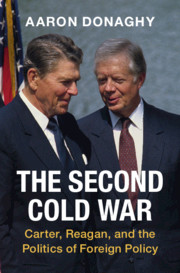Reagan, Congress, and Human Rights
Contesting Morality in US Foreign Policy
£29.99
Part of Human Rights in History
- Author: Rasmus Sinding Søndergaard, Danish Institute for International Studies
- Date Published: August 2022
- availability: Available
- format: Paperback
- isbn: 9781108797184
£
29.99
Paperback
Other available formats:
Hardback, eBook
Looking for an inspection copy?
This title is not currently available on inspection
-
This book traces the role of human rights concerns in US foreign policy during the 1980s, focusing on the struggle among the Reagan administration and members of Congress. It demonstrates how congressional pressure led the administration to reconsider its approach to human rights and craft a conservative human rights policy centered on democracy promotion and anti-communism - a decision which would have profound implications for American attention to human rights. Based on extensive archival research and interviews, Rasmus Sinding Søndergaard combines a comprehensive overview of human rights in American foreign relations with in-depth case studies of how human rights shaped US foreign policy toward Soviet Jewry, South African apartheid, and Nicaragua. Tracing the motivations behind human rights activism, this book demonstrates how liberals, moderates, and conservatives selectively invoked human rights to further their agendas, ultimately contributing to the establishment of human rights as a core moral language in US foreign policy.
Read more- Provides the first comprehensive history of human rights in American foreign relations in the 1980s centered on the relationship between the Reagan administration and members of Congress
- Introduces influential but often-overlooked members of Congress to the history of human rights to offer an examination of how individual members of Congress shaped US human rights policy
- Combines a broad assessment of human rights in American foreign relations with in-depth case studies of how human rights shaped US foreign policy toward Soviet Jewry, South African apartheid, and Nicaragua
Reviews & endorsements
'In explaining how idealists in Congress forced the Reagan administration to embrace and recast human rights, Søndergaard reveals how profoundly the trajectory of US human rights policy was determined by contestation between the executive and the legislature. This richly researched book illuminates a poorly understood decade in the development of international human rights and recovers the role of overlooked actors, both in Congress and outside government.' Barbara Keys, Durham University
See more reviews'An engaging and original contribution to our understanding of the place of human rights in US foreign policy in the 1980s. Rasmus Søndergaard is particularly effective in highlighting the significance of the newly-formed Congressional Human Rights Caucus (CHRC) and articulating what a 'conservative' human rights policy meant during the Reagan years.' Sarah B. Snyder, American University, Washington DC
'Søndergaard makes an important contribution to our understanding of human rights in US Cold War foreign relations. Drawing on deep archival research, Reagan, Congress, and Human Rights convincingly illuminates how legislators on both sides of the political aisle influenced the Reagan administration's approach to the defining human rights issues of the 1980s.' William Michael Schmidli, Universiteit Leiden
'This excellent study examines how Congress asserted a role in incorporating human rights into the [Reagan] administration's foreign policy, especially through the bipartisan Congressional Human Rights Caucus (CHRC).' A. J. Dunar, Choice
'The argument that it was the Congressional assertion of the importance of human rights that forced the Administration to make it a significant part of its foreign policy agenda is compelling. That this assertion was bipartisan and only contested in terms of the location of its application, rather than the principle itself, makes this argument all the more intriguing.' Mark Hurst, Diplomacy & Statecraft
'The book will make a lasting contribution to our understanding of the foreign policy continuity across the final decades of the Cold War. Søndergaard has written a sequel to Barbara Keys' Reclaiming American Virtue: The Human Rights Revolution of the 1970s (2014). Like her, he has obliged us to rethink easy caricatures of US power.' Timothy J. Lynch, Journal of Contemporary History
The persistence in contemporary debates of many of the political patterns highlighted by Søndergaard further underscores the importance of this book, which should be required reading for anyone interested in the domestic politics of human rights or legislative-executive relations on foreign policy. Jordan Tama, Diplomatica
'… an excellent study that challenges many previous understandings of Reagan's foreign policy and the role of Congress in the 1980s. As Søndergaard demonstrates, while the administration's use of human rights was selective and only genuinely pursued when connected to its anti-communist efforts, it nonetheless 'helped secure human rights as the key moral language in American foreign relations'.' Kristina Spohr, Diplomatic History
'The book will make a lasting contribution to our understanding of the foreign policy continuity across the final decades of the Cold War … Søndergaard reminds us that American politics is sometimes compromised but often advantaged by its endemic contestation over moral questions.' Timothy J. Lynch, Journal of Contemporary History
Customer reviews
Not yet reviewed
Be the first to review
Review was not posted due to profanity
×Product details
- Date Published: August 2022
- format: Paperback
- isbn: 9781108797184
- length: 324 pages
- dimensions: 229 x 152 x 17 mm
- weight: 0.439kg
- contains: 7 b/w illus.
- availability: Available
Table of Contents
Introduction
1. After the breakthrough: human rights in American foreign relations in the 1980s
2. The Reagan turnaround on human rights
3. The Congressional human rights caucus and the limits of bipartisanship
4. The right to leave: Soviet Jewish emigration
5. 'A universal human rights issue': South African apartheid
6. Two tales of human rights: US policy toward Nicaragua
Conclusion.
Sorry, this resource is locked
Please register or sign in to request access. If you are having problems accessing these resources please email [email protected]
Register Sign in» Proceed
You are now leaving the Cambridge University Press website. Your eBook purchase and download will be completed by our partner www.ebooks.com. Please see the permission section of the www.ebooks.com catalogue page for details of the print & copy limits on our eBooks.
Continue ×Are you sure you want to delete your account?
This cannot be undone.
Thank you for your feedback which will help us improve our service.
If you requested a response, we will make sure to get back to you shortly.
×




